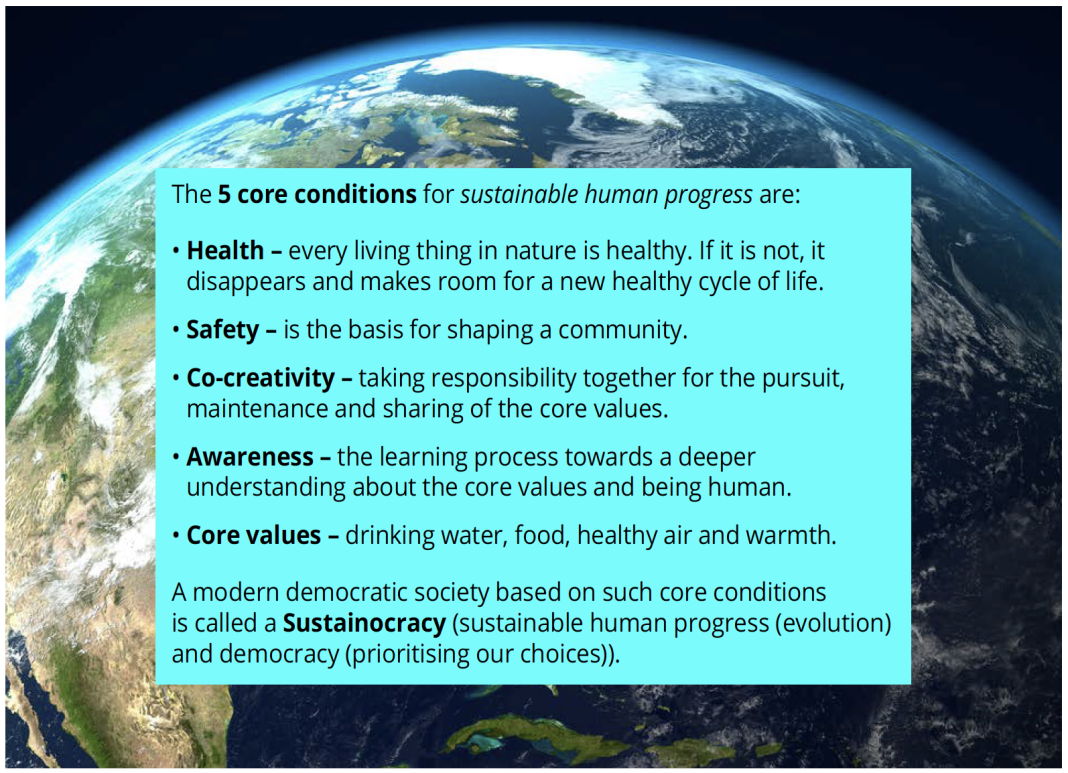Jean-Paul Close is the Founder of STIR Foundation, which stands for Sustainocracy, Transformation, Indexation, and Research. Here, he shares how this organization works to develop local holistic solutions to global problems using a sustainocratic ideology
The STIR foundation: A catalyst for change
When we discuss the issues of ‘sustainable development,’ we tend to worry about material resources, our impact on the environment, climate change, our economies, sustaining our current levels of comfort, etc. We never seem to worry about the essential conditions for our sustainable existence as a human species.
When we do, a new reality manifests itself to us. A reality that transforms our societies, our economies, our relationship with nature, the functioning of our institutions, and our sustainable perspectives.
The STIR foundation was registered in 2009, just after the global banking crisis upset our trust in money as a solution for everything. STIR positioned itself as a small research foundation that experiments with five core natural human values (fig. 1) as a shared responsibility (fig. 2) between people and institutions. It based its approach on the philosophy of the ‘entrepreneurship of the 21st century’ defined by the founder in terms of ‘people and planet working together for the common good’.
In a fragmented political, economic society, where financial self-interests define the interaction between the different leadership archetypes, STIR decided to apply ‘the positive invitation’ to participate directly to all the different local silos (government, business, citizens, science, and education). The core human essentials were hoped to have a converging nature, especially when addressing key issues in the complexity of our current anthropocenic era. Money, in this case, becomes a means, not a goal, just like awareness, creativity, teamwork, sense of responsibility, technology, applied knowledge, etc. The shared objectives are placed within the scope of the natural existential human values.
From industrial hub to smart city: A co-operative society
In our hometown, Eindhoven, in the Netherlands, we already broke with the heritage of our old industrial dependence. This precedent happened when a large multinational decided to move its facilities to China after a century of impactful and demanding presence. The city redefined its identity within the political-economic playing field. In 2011, the region received the label of smartest in the world. STIR challenged this label since the region was centered on the highest levels of air pollution in Northwest Europe. How smart are we when we damage our own wellness through pollution? Regulation and technological innovations had reduced the problem significantly over decades, against huge costs and bureaucratic layers, but it was not enough. Health issues were rising, impacting general wellness, productivity, regional growth plans, healthcare, and inflation.
Sustainocracy
Our shared responsibility for our sustainable human existence through respecting the essential natural values that support this.
STIR Foundation: Overcoming challenges and building partnerships
That is why the open invitation of STIR to take responsibility together for our health and environment was a welcome approach that none of the silos could have realized by itself. It took a while for participants to accept their role at the STIR co-creation table and develop a cooperative ‘healthy city and region’ mindset together. It may sound simple enough to share such an important responsibility, but reality proved to be much more complex.
The environment of co-creation, in a multidisciplinary context, working together on immaterial human values, requires not only investment in policy, science, and technology. It also implies significant behavioral adjustments, development of productive, Inter-silo relationships, a new mindset, letting go of old controls, opening up to transformative changes, focusing on shared results and impact, etc. A new environment emerged for all the participants to get acquainted with and somehow integrate within their traditional operational realities. Also, citizens, who were used to critically valuing the government decisions, were now confronted with their own share of responsibility. These levels of values- driven self and shared reflections would be unthinkable in the reality of the fragmented islands of political and financial self-interests. At the STIR table, the unthinkable became possible. Gradually, institutional structures started to adapt themselves, motivated by the common objective, challenges at hand, and opportunities sensed. The tension between the money and values-driven environments became visible, leading to difficult considerations about which to lead. The STIR initiatives never had personnel or any means of their own. They just developed a multidimensional partner platform around a prioritized shared natural human values-centered objective.
A values-driven approach
The transformative ‘economy of values’ emerged and developed as a new societal ecosystem. The old money-driven and dependent mindset could get an impulse when seeing all the new openings and innovative opportunities that were arising. The entire region, its functioning, and its economy were transforming, affecting all elements of society. As the local society adjusted to the new common story of integral and positive health, the different STIR tables also needed to learn how to remain adaptive to the transforming reality, facilitating and triggering its evolution, not conducting it. Also, this was new for the partners.
Inspiring change worldwide: The STIR Foundation
Internationally, the attention was caught, with the interest of particular regions to also adopt the cooperative process, adjusted to their own complex challenges at hand (air quality, local food resilience, citizen engagement, social cohesion in a multicultural environment, clean water, local energy, etc.). Our sustainable future as human beings is gradually becoming recognized as a shared responsibility, a self-aware, core human values-driven cooperation between specialized institutions and citizens alike.



